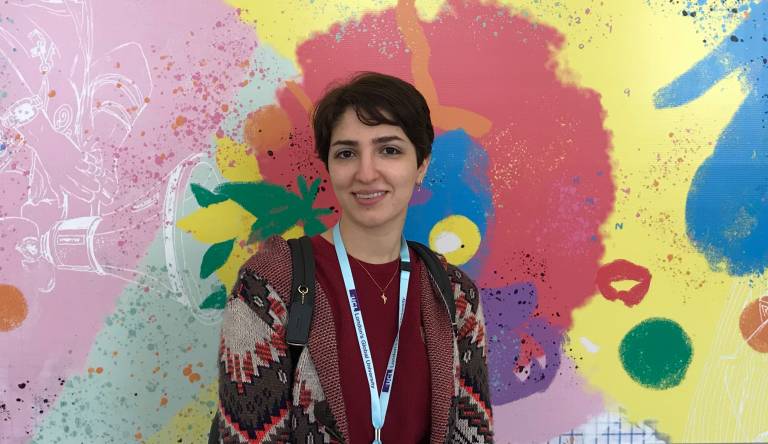Five Questions with Farnaz Fahimi
1 May 2020
Farnaz Fahimi Hanzaee joined EEE as a Research Assistant, working within the Sensors Systems and Circuits Group. She answered a few questions, so we get to know her better.

Tell us about your background
I received my bachelor’s degree in electrical engineering in 2014 from the Iran University of Science and Technology, and my MSc in Bioengineering in 2018 from the Tehran Polytechnic. In 2019 I obtained an MRes in Neurotechnology from Imperial College London and have now returned to an electrical engineering department (where I feel more at home!) as a Research Assistant and part-time PhD student at UCL since January 2020.
My research focus during my MSc and MRes was mostly on neural electrical stimulation and circuit design for implants, and I am currently working on the electronics of electrical impedance tomography (EIT). This is a non-invasive radiation-free imaging technique that can be used to, for example, monitor lung function in preterm neonatal patients.
What do you like about working in High Education?
The more I have been involved in research projects over the past few years, the more I have been drawn to its dynamics and the problem-solving challenges that motivate me to try to learn more about my field and beyond it every day. What I most like about working in higher education is the freedom that I have to be creative, think outside the box and to not necessarily confine myself to the solutions that have been tried in the past, while also having the great privilege of interacting with colleagues who are experts in the field and learning from their experiences.
Who inspires you?
A person who has inspired me is the late mathematician Maryam Mirzakhani (1977-2017) who, as the first female recipient of the Fields Medal, showed that with persistence and determination, boundaries can be broken, and novel insights could be reached where one's passions lie.
What are you passionate about outside of work?
As for activities in my spare time, I have always enjoyed drawing/painting with various media; whenever I am overwhelmed with work or tackling a hard question, drawing in particular helps me to ease my mind and try to refresh my thoughts.
Who would you most like to swap places with for a day?
Working on neural implants during my master’s programmes has led me to become quite passionate about the future implications of these devices, especially visual implants. I was really touched when watching a video clip a few years back in which a patient sensed their first sight of light after a long time. Since then, I have always imagined how amazing it would feel to be one of the engineers who could witness their implant begin to restore almost complete eyesight to a patient for the first time. Hopefully, the realisation of such devices will not be too distant in the future.
 Close
Close

